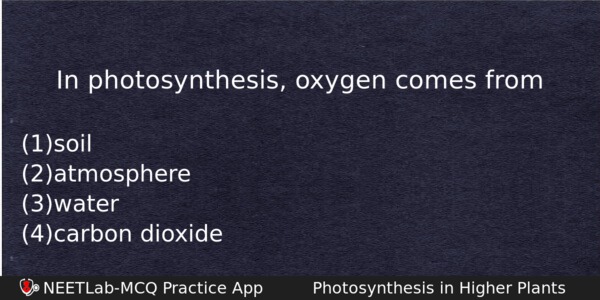| ⇦ | 
| ⇨ |
In photosynthesis, oxygen comes from
Options
(a) soil
(b) atmosphere
(c) water
(d) carbon dioxide
Correct Answer:
water
Explanation:
During non-cyclic photophosphorylation photolysis of water, release of O₂ and formation of NADPH takes place, while ATP is synthesized in both the cyclic as well as non-cyclic photophosphorylations. In cyclic photophosphorylation, while passing between ferredoxin and plastoquinone and or over the cytochrome complex, the electron loses sufficient energy to form ATP from ADP and inorganic phosphate. In non-cyclic photophosphorylation, while passing over cytochrome complex, the electrons losses sufficient e
Related Questions: - In an uqright pyramid of biomass, the herbivores occupy the position
- Nervous conduct impulses by
- In angiosperms each microspore mother cell undergoing meiosis gives rise to
- SirJC Bose proposed which of the following theory to explain the process of
- An all-out sprint can’t continue for more than 40 seconds because
Topics: Photosynthesis in Higher Plants
(153)
Subject: Biology
(4253)
Important MCQs Based on Medical Entrance Examinations To Improve Your NEET Score
- In an uqright pyramid of biomass, the herbivores occupy the position
- Nervous conduct impulses by
- In angiosperms each microspore mother cell undergoing meiosis gives rise to
- SirJC Bose proposed which of the following theory to explain the process of
- An all-out sprint can’t continue for more than 40 seconds because
Topics: Photosynthesis in Higher Plants (153)
Subject: Biology (4253)
Important MCQs Based on Medical Entrance Examinations To Improve Your NEET Score
18000+ students are using NEETLab to improve their score. What about you?
Solve Previous Year MCQs, Mock Tests, Topicwise Practice Tests, Identify Weak Topics, Formula Flash cards and much more is available in NEETLab Android App to improve your NEET score.
Share this page with your friends

Leave a Reply